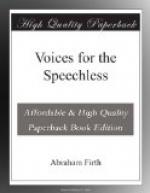REV. H. BERNARD CARPENTER.
* * * * *
EXULTING SINGS.
Sweet morn! from countless cups
of gold
Thou liftest reverently on high
More incense fine than earth can hold,
To fill the sky.
The lark by his own carol blest,
From thy green harbors eager springs;
And his large heart in little breast
Exulting sings.
The fly his jocund round unweaves,
With choral strain the birds salute
The voiceful flocks, and nothing grieves,
And naught is mute.
To thousand tasks of fruitful hope,
With skill against his toil, man bends
And finds his work’s determined scope
Where’er he wends.
From earth, and earthly toil and
strife,
To deathless aims his love may rise,
Each dawn may wake to better life,
With purer eyes.
JOHN STERLING.
* * * * *
IN HOLY BOOKS.
In holy books we read how God hath
spoken
To holy men in many different ways;
But hath the present worked no sign nor token?
Is God quite silent in these latter days?
The word were but a blank,
a hollow sound,
If He that spake
it were not speaking still;
If all the light and all the
shade around
Were aught but
issues of Almighty Will.
So, then, believe that
every bird that sings,
And every flower
that stars the elastic sod,
And every thought the happy
summer brings,
To the pure spirit
is a word of God.
HARTLEY COLERIDGE.
* * * * *
THE BELL OF ATRI.
At Atri in Abruzzo, a small
town
Of ancient Roman date, but
scant renown,
One of those little places
that have run
Half up the hill, beneath
a blazing sun,
And then sat down to rest,
as if to say,
“I climb no farther
upward, come what may,”—
The Re Giovanni, now unknown
to fame,
So many monarchs since have
borne the name,
Had a great bell hung in the
market-place
Beneath a roof, projecting
some small space,
By way of shelter from the
sun and rain.
Then rode he through the streets
with all his train,
And, with the blast of trumpets
loud and long,
Made proclamation, that whenever
wrong
Was done to any man, he should
but ring
The great bell in the square,
and he, the King,
Would cause the Syndic to
decide thereon.
Such was the proclamation
of King John.
How swift the happy days in
Atri sped,
What wrongs were righted,
need not here be said.
Suffice it that, as all things
must decay,
The hempen rope at length
was worn away,
Unravelled at the end, and
strand by strand,
Loosened and wasted in the
ringer’s hand,
Till one, who noted this in
passing by,
Mended the rope with braids
of briony,
So that the leaves and tendrils
of the vine
Hung like a votive garland
at a shrine.




